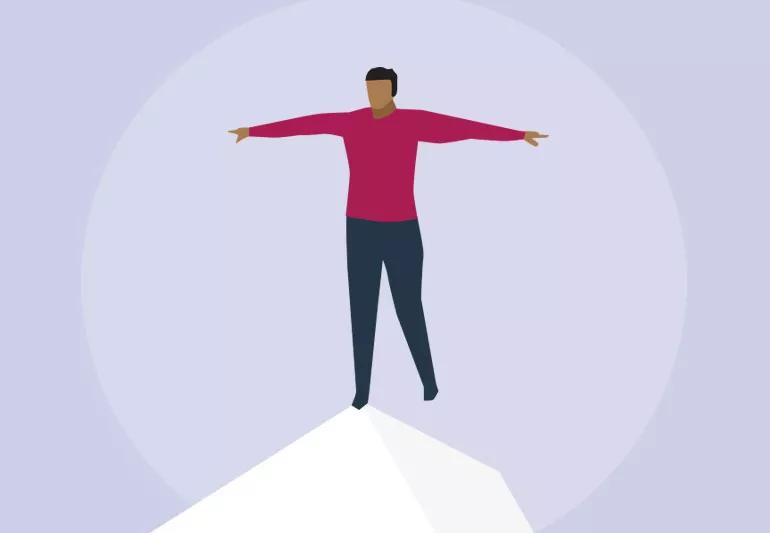Is it clumsiness or something more serious?

Image content: This image is available to view online.
View image online (https://assets.clevelandclinic.org/transform/4c36d9d8-27f9-452e-b60c-1af009d3492a/balance-876772474-770x553-1_jpg)
Man balancing on edge
You bump into tables all the time. You’ve lost count of the number of times you’ve stubbed your little toe on the doorframe. When you practice yoga, your tree pose looks more like a … fallen tree.
Advertisement
Cleveland Clinic is a non-profit academic medical center. Advertising on our site helps support our mission. We do not endorse non-Cleveland Clinic products or services. Policy
Are you a little clumsy? Or could your balance problem be something bigger?
Usually, true balance disorders go beyond run-of-the-mill klutziness, says audiologist Julie Honaker, PhD, CCCA, Director of the Vestibular and Balance Disorders Program.
But “balance disorders” include a broad range of problems, from minor lightheadedness to feeling like you’re standing on a boat (on one foot, during a hurricane).
Dr. Honaker shares more about the common causes of balance problems — and how to keep marching steady.
The inner ear is the HQ for the body’s balance, or vestibular, system. When something goes awry with that system, a whole range of symptoms can result, including:
Any number of other things can knock your balance off-kilter, Dr. Honaker says. Something relatively minor, like dehydration or fatigue, can cause a bout of unsteadiness. But what if you’re hydrated, rested — and still stumbling? These are some of the usual suspects.
Medication is one of the most common culprits of balance problems.
Advertisement
“So often, dizziness is listed as a side effect of medications,” Dr. Honaker points out. If you’re taking multiple prescription meds, they’re even more likely to interact in ways that leave you wobbly.
A virus can infect the ear and derail your sense of balance. Sometimes, colds can cause pressure changes in the middle ear, with the same dizzying effects. These infections usually resolve on their own.
Don’t get too excited — this is less blingy than it sounds. Turns out, we have tiny crystals of calcium carbonate in the inner ear, which play a role in gravity sensing. (Who knew?) Sometimes, the crystals meander into parts of the inner ear where they don’t belong, Dr. Honaker says.
When that happens, you can feel like the room is whirling around you — especially when you move your head suddenly, like rolling over in bed or tipping your head back for a shampoo at the salon. The official name of this disorder is a mouthful: benign paroxysmal positional vertigo. It’s the most common cause of vertigo (and, phew, it’s treatable).
Meniere’s disease causes large amounts of fluid to collect in the inner ear. In addition to dizziness, it can cause hearing problems and ringing in the ears.
The bad news: Meniere’s attacks are unpredictable and may be severe. The good news: You can often manage the disease with diet changes and medication.
You are older and wiser — but perhaps slightly less steady. The inner ear balance system can decline as you age, Dr. Honaker says. Meanwhile, the strength of your eyesight, hearing and even sense of touch can deteriorate — all of which can contribute to poor balance.
But pull on your yoga pants and grab your mat, because balance-boosting exercises like tai chi and yoga can help keep you steady. “It’s important to engage our balance system through regular exercise,” Dr. Honaker says. “If you don’t use it, you lose it.”
If something seems off with your balance, it’s wise to see a doctor to investigate possible suspects, Dr. Honaker says.
Inner ear problems are often to blame, so definitely mention symptoms such as changes in hearing, ringing or a feeling of fullness in the ears. But sometimes, the problem is related to other issues, such as neurological problems or even heart problems.
Since so many different things can mess with your balance, it makes sense to talk to your primary care doctor first. He or she can help narrow down the suspect list before you visit any specialists.
Many vestibular problems are treatable, Dr. Honaker says, so don’t be afraid to get to the bottom of it.
Advertisement
To prevent falls, Dr. Honaker has this advice:
Advertisement

Delivered every Tuesday!
Sign up for our Health Essentials emails for expert guidance on nutrition, fitness, sleep, skin care and more
It's a letter about the news!

Every two weeks once
Sign up for our Health Essentials emails for expert guidance on nutrition, fitness, sleep, skin care and more.
Learn more about our editorial process.
Advertisement
Most recommended precautions center around minimizing bruising or swelling
Even one drink can have an impact on your cognitive function leading to slurred speech, blurred vision and impaired memory
Understand who may (and may not) benefit
Lorem ipsum dolor sit amet. Et odio Quis vel ipsam omnis eum alias deleniti et placeat impedit non voluptas galisum hic autem enim et cupiditate aliquid. Est beatae quidem non facilis autem ut commodi nisi aut tempore rerum et dolores voluptatem cum enim optio id sapiente quasi. Ad laboriosam officiis 33 cupiditate sequi ea voluptatum consectetur qui necessitatibus voluptate et quasi doloremque et facere explicabo quo explicabo officia
Seeking help through therapy can be an important step in improving your quality of life when you have UC
Type 2 diabetes isn’t inevitable with these dietary changes
Applying a hot or cold compress can help with pain
Pump up your iron intake with foods like tuna, tofu and turkey